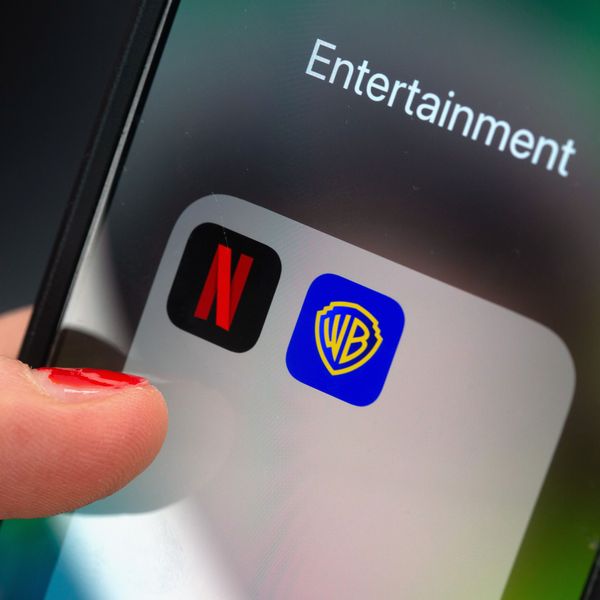
The entrance to Simon & Schuster publishing house is seen in New York City on April 27, 2022. (Photo: Lindsey Nicholson/UCG/Universal Images Group via Getty Images)
'Major Milestone' as Judge Halts Mega-Merger Between US Publishing Giants
The ruling could foretell future antitrust enforcement against Amazon, advocates said.
Authors and antitrust advocates alike on Tuesday celebrated a federal judge's ruling that blocked publishing company Penguin Random House from buying one of its top competitors, marking what one observer called a "major milestone" in anti-monopoly enforcement and potentially signaling future actions against retail giant Amazon.
Judge Florence Y. Pan of the U.S. Court of Appeals for the District of Columbia Circuit ruled that the proposed $2.175 billion merger would "substantially" harm competition as publishing houses compete for the rights to publish new books, which the U.S. Justice Department had argued would drive down compensation for authors.
"This decision is an enormous win for America's book publishing business--especially readers, authors, and editors," said Barry Lynn, executive director of the Open Markets Institute, which works to combat monopolization. "This is also a huge win for America's system of antitrust law--designed to protect creators, workers, independent businesses, and consumers from consolidated power and control."
The Biden administration focused its arguments on the effects the merger would have on the authors of highly-anticipated books, and government attorneys were supported by literary agents and renowned authors including Stephen King, who expressed concern for writers who are just starting out in their publishing careers.
"Publishing should be more focused on cultural growth and literary achievement and less on corporate balance sheets," King told The New York Times after the ruling was announced late Monday.
\u201cI am delighted that Judge Florence Pan has blocked the merger of Penguin Random House and Simon & Schuster. The proposed merger was never about readers and writers; it was about preserving (and growing) PRH's market share. In other words: $$$\u201d— Stephen King (@Stephen King) 1667264109
Stacy Mitchell, co-director of the Institute for Local Self-Reliance, said the DOJ's focus on potential lost income for authors was significant.
\u201c6. Where might this ruling lead us? One doesn\u2019t have to look far to see widespread evidence of monopolies pushing down incomes \u2014 farmers bankrupted by agribusiness giants, nurses squeezed by merging hospitals, online sellers paying huge tolls to Amazon, and on and on.\u201d— Stacy Mitchell (@Stacy Mitchell) 1667307247
"This ruling begins to lay a path to solve our monopoly problem--a path in which enforcers and the courts block mergers and break up monopolies because they understand that concentrated power inevitably harms people, whether as consumers, producers, or citizens," said Mitchell.
The DOJ also argued that the merger could ultimately cut down on the number and diversity of books published each year--countering Penguin Random House and Simon & Schuster's claim that the merged companies would be able to reduce their costs and spend more money on books.
"Today's decision protects vital competition for books and is a victory for authors, readers, and the free exchange of ideas," Assistant Attorney General Jonathan Kanter said in a statement Monday. "The proposed merger would have reduced competition, decreased author compensation, diminished the breadth, depth, and diversity of our stories and ideas, and ultimately impoverished our democracy."
Antitrust advocates noted that the ruling could foretell antitrust enforcement against Amazon, which controls 80% of the ecommerce market share across numerous products including books.
\u201c9. It certainly begs the question: Can Amazon\u2019s monopoly power over the book industry be allowed to stand? After all, Amazon is an even more dominant gatekeeper in books than these two publishers combined.\u201d— Stacy Mitchell (@Stacy Mitchell) 1667307247
"There's extensive evidence that Amazon's stranglehold in books has pushed down authors' incomes and reduced the range of titles that find their way into print and into readers' hands--exactly the arguments the DOJ made in this case," said Mitchell.
While Penguin Random House and its parent company, Bertelsmann, said they would appeal Pan's ruling, Lynn called on the publishers to devote their "money and time to working in tandem with other publishers to help the U.S. government prepare a winning case against Amazon's book business."
An Urgent Message From Our Co-Founder
Dear Common Dreams reader, The U.S. is on a fast track to authoritarianism like nothing I've ever seen. Meanwhile, corporate news outlets are utterly capitulating to Trump, twisting their coverage to avoid drawing his ire while lining up to stuff cash in his pockets. That's why I believe that Common Dreams is doing the best and most consequential reporting that we've ever done. Our small but mighty team is a progressive reporting powerhouse, covering the news every day that the corporate media never will. Our mission has always been simple: To inform. To inspire. And to ignite change for the common good. Now here's the key piece that I want all our readers to understand: None of this would be possible without your financial support. That's not just some fundraising cliche. It's the absolute and literal truth. We don't accept corporate advertising and never will. We don't have a paywall because we don't think people should be blocked from critical news based on their ability to pay. Everything we do is funded by the donations of readers like you. Will you donate now to help power the nonprofit, independent reporting of Common Dreams? Thank you for being a vital member of our community. Together, we can keep independent journalism alive when it’s needed most. - Craig Brown, Co-founder |
Authors and antitrust advocates alike on Tuesday celebrated a federal judge's ruling that blocked publishing company Penguin Random House from buying one of its top competitors, marking what one observer called a "major milestone" in anti-monopoly enforcement and potentially signaling future actions against retail giant Amazon.
Judge Florence Y. Pan of the U.S. Court of Appeals for the District of Columbia Circuit ruled that the proposed $2.175 billion merger would "substantially" harm competition as publishing houses compete for the rights to publish new books, which the U.S. Justice Department had argued would drive down compensation for authors.
"This decision is an enormous win for America's book publishing business--especially readers, authors, and editors," said Barry Lynn, executive director of the Open Markets Institute, which works to combat monopolization. "This is also a huge win for America's system of antitrust law--designed to protect creators, workers, independent businesses, and consumers from consolidated power and control."
The Biden administration focused its arguments on the effects the merger would have on the authors of highly-anticipated books, and government attorneys were supported by literary agents and renowned authors including Stephen King, who expressed concern for writers who are just starting out in their publishing careers.
"Publishing should be more focused on cultural growth and literary achievement and less on corporate balance sheets," King told The New York Times after the ruling was announced late Monday.
\u201cI am delighted that Judge Florence Pan has blocked the merger of Penguin Random House and Simon & Schuster. The proposed merger was never about readers and writers; it was about preserving (and growing) PRH's market share. In other words: $$$\u201d— Stephen King (@Stephen King) 1667264109
Stacy Mitchell, co-director of the Institute for Local Self-Reliance, said the DOJ's focus on potential lost income for authors was significant.
\u201c6. Where might this ruling lead us? One doesn\u2019t have to look far to see widespread evidence of monopolies pushing down incomes \u2014 farmers bankrupted by agribusiness giants, nurses squeezed by merging hospitals, online sellers paying huge tolls to Amazon, and on and on.\u201d— Stacy Mitchell (@Stacy Mitchell) 1667307247
"This ruling begins to lay a path to solve our monopoly problem--a path in which enforcers and the courts block mergers and break up monopolies because they understand that concentrated power inevitably harms people, whether as consumers, producers, or citizens," said Mitchell.
The DOJ also argued that the merger could ultimately cut down on the number and diversity of books published each year--countering Penguin Random House and Simon & Schuster's claim that the merged companies would be able to reduce their costs and spend more money on books.
"Today's decision protects vital competition for books and is a victory for authors, readers, and the free exchange of ideas," Assistant Attorney General Jonathan Kanter said in a statement Monday. "The proposed merger would have reduced competition, decreased author compensation, diminished the breadth, depth, and diversity of our stories and ideas, and ultimately impoverished our democracy."
Antitrust advocates noted that the ruling could foretell antitrust enforcement against Amazon, which controls 80% of the ecommerce market share across numerous products including books.
\u201c9. It certainly begs the question: Can Amazon\u2019s monopoly power over the book industry be allowed to stand? After all, Amazon is an even more dominant gatekeeper in books than these two publishers combined.\u201d— Stacy Mitchell (@Stacy Mitchell) 1667307247
"There's extensive evidence that Amazon's stranglehold in books has pushed down authors' incomes and reduced the range of titles that find their way into print and into readers' hands--exactly the arguments the DOJ made in this case," said Mitchell.
While Penguin Random House and its parent company, Bertelsmann, said they would appeal Pan's ruling, Lynn called on the publishers to devote their "money and time to working in tandem with other publishers to help the U.S. government prepare a winning case against Amazon's book business."
Authors and antitrust advocates alike on Tuesday celebrated a federal judge's ruling that blocked publishing company Penguin Random House from buying one of its top competitors, marking what one observer called a "major milestone" in anti-monopoly enforcement and potentially signaling future actions against retail giant Amazon.
Judge Florence Y. Pan of the U.S. Court of Appeals for the District of Columbia Circuit ruled that the proposed $2.175 billion merger would "substantially" harm competition as publishing houses compete for the rights to publish new books, which the U.S. Justice Department had argued would drive down compensation for authors.
"This decision is an enormous win for America's book publishing business--especially readers, authors, and editors," said Barry Lynn, executive director of the Open Markets Institute, which works to combat monopolization. "This is also a huge win for America's system of antitrust law--designed to protect creators, workers, independent businesses, and consumers from consolidated power and control."
The Biden administration focused its arguments on the effects the merger would have on the authors of highly-anticipated books, and government attorneys were supported by literary agents and renowned authors including Stephen King, who expressed concern for writers who are just starting out in their publishing careers.
"Publishing should be more focused on cultural growth and literary achievement and less on corporate balance sheets," King told The New York Times after the ruling was announced late Monday.
\u201cI am delighted that Judge Florence Pan has blocked the merger of Penguin Random House and Simon & Schuster. The proposed merger was never about readers and writers; it was about preserving (and growing) PRH's market share. In other words: $$$\u201d— Stephen King (@Stephen King) 1667264109
Stacy Mitchell, co-director of the Institute for Local Self-Reliance, said the DOJ's focus on potential lost income for authors was significant.
\u201c6. Where might this ruling lead us? One doesn\u2019t have to look far to see widespread evidence of monopolies pushing down incomes \u2014 farmers bankrupted by agribusiness giants, nurses squeezed by merging hospitals, online sellers paying huge tolls to Amazon, and on and on.\u201d— Stacy Mitchell (@Stacy Mitchell) 1667307247
"This ruling begins to lay a path to solve our monopoly problem--a path in which enforcers and the courts block mergers and break up monopolies because they understand that concentrated power inevitably harms people, whether as consumers, producers, or citizens," said Mitchell.
The DOJ also argued that the merger could ultimately cut down on the number and diversity of books published each year--countering Penguin Random House and Simon & Schuster's claim that the merged companies would be able to reduce their costs and spend more money on books.
"Today's decision protects vital competition for books and is a victory for authors, readers, and the free exchange of ideas," Assistant Attorney General Jonathan Kanter said in a statement Monday. "The proposed merger would have reduced competition, decreased author compensation, diminished the breadth, depth, and diversity of our stories and ideas, and ultimately impoverished our democracy."
Antitrust advocates noted that the ruling could foretell antitrust enforcement against Amazon, which controls 80% of the ecommerce market share across numerous products including books.
\u201c9. It certainly begs the question: Can Amazon\u2019s monopoly power over the book industry be allowed to stand? After all, Amazon is an even more dominant gatekeeper in books than these two publishers combined.\u201d— Stacy Mitchell (@Stacy Mitchell) 1667307247
"There's extensive evidence that Amazon's stranglehold in books has pushed down authors' incomes and reduced the range of titles that find their way into print and into readers' hands--exactly the arguments the DOJ made in this case," said Mitchell.
While Penguin Random House and its parent company, Bertelsmann, said they would appeal Pan's ruling, Lynn called on the publishers to devote their "money and time to working in tandem with other publishers to help the U.S. government prepare a winning case against Amazon's book business."

